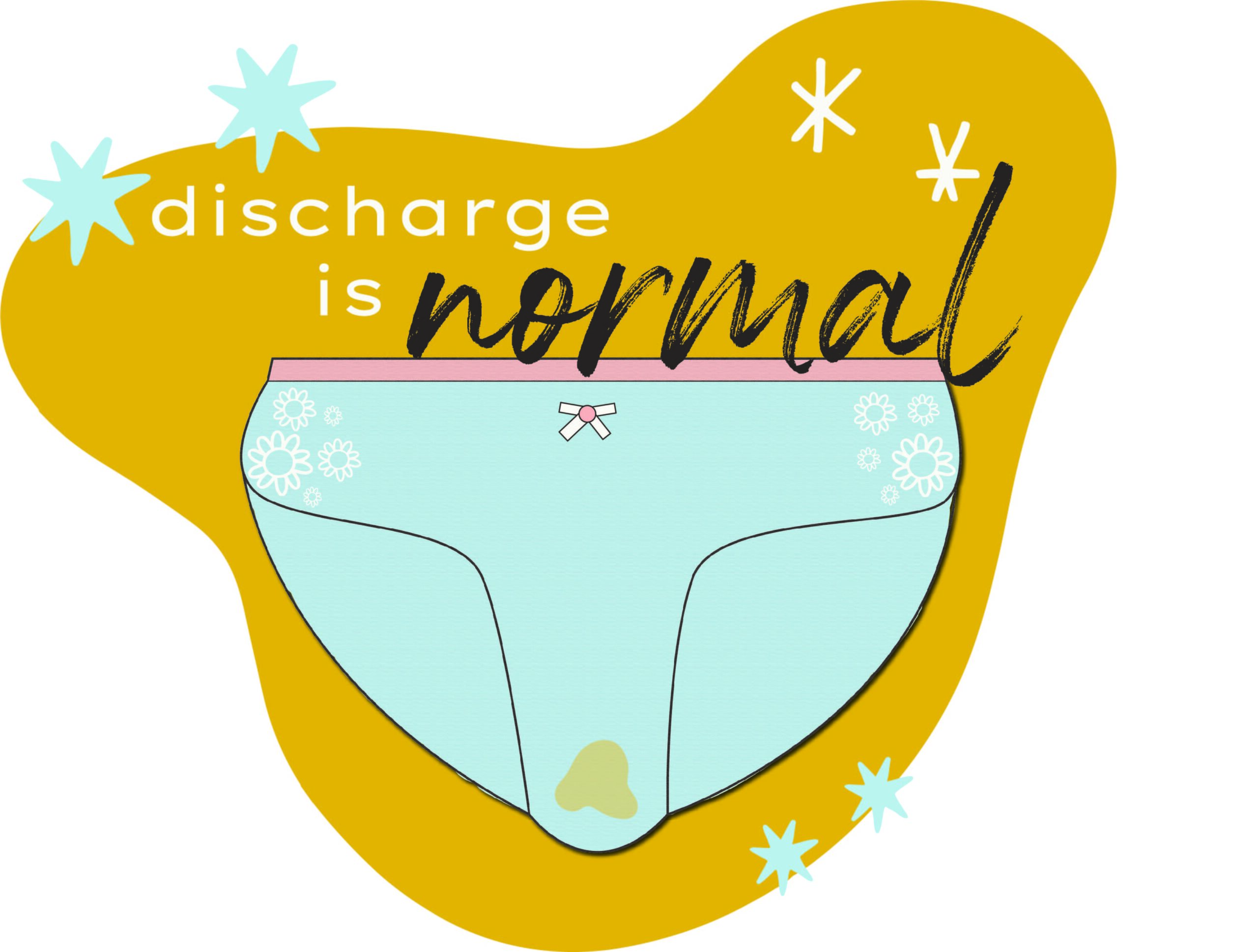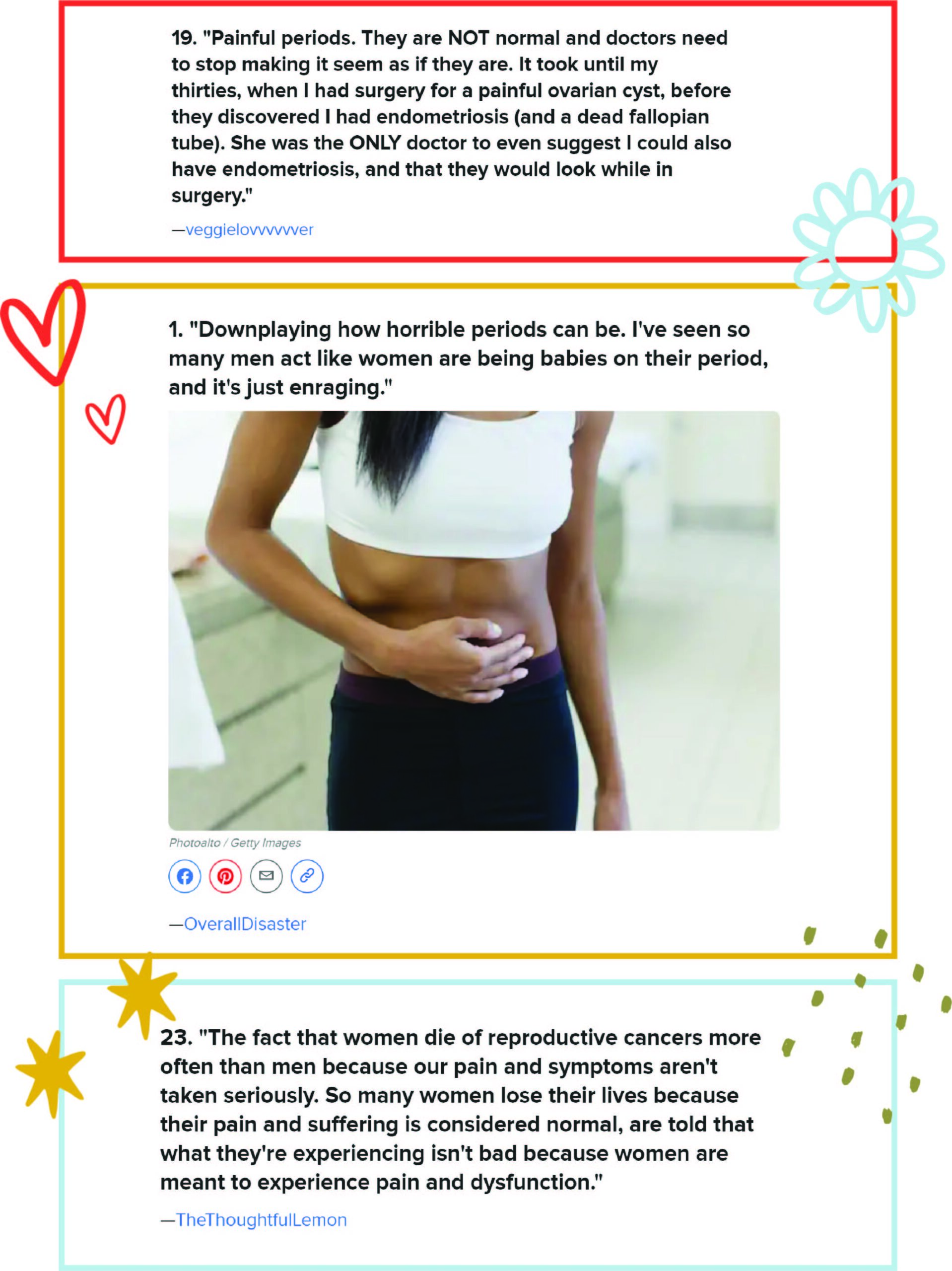Diving deep into the vagina: a Betty’s most celebrated yet elusive body part
Despite a rise in pop culture references urging us to embrace our vaginas – cue Cardi B and Megan Thee Stallion’s “WAP” and Janelle Monae’s “PYNK” – there are still MANY things that our Betties probably don’t know about their vajayjays. Few places on the internet reveal how little many of us know about our bodies as much as Buzzfeed does.
If you’re not familiar with Buzzfeed, umm… 1) where have you been? and 2) welcome to the internet! Buzzfeed receives a ton of comments and questions from their community, many of whom are young adults aged 18-34 like our Betties. One of the Buzzfeed community’s seemingly-favorite topics is women’s health!
We love that Buzzfeed highlights what life is like for vagina owners, but some of the comments leave us with more questions than answers! This is the case for two of their recent articles which focus on facts vagina-owners wish they knew earlier and stories about their sexist experiences. So, as your go-to place for women’s wellness, we’re doing a Betty’s-style review.
VAGINA TALK
One of the most mysterious aspects of having a vagina is figuring out the whole discharge situation.

We have a very important announcement for all of you Betties: vaginal discharge is TOTALLY normal! It’s the liquidy stuff you sometimes find in your underwear. Discharge is a routine physiological function of the vagina, which changes throughout your menstrual cycle.
What’s also normal about discharge is that it can even change – or “bleach” – the color of the fabric on the high-contact part of your undies – the crotch. It doesn’t always do this, but the acidity of vaginal pH, heavy wear, and washing can affect the color of the fabric. And that’s totally okay. We actually don’t recommend using a pantiliner to catch discharge – using one daily often leads to more buildup than without.
Okay, so there is some discharge that isn’t “normal” and is usually identifiable by smell and color. Like, a greenish or dark yellow discharge (like puss) that has a foul odor might be a sign of vaginitis – a treatable vaginal infection. If you ever have any concerns about the amount or smell of your discharge, or anything else that seems out of the ordinary for your body, check with a gynecologist who can diagnose and treat any issues.
We are thrilled to announce the launch of our virtual clinic on July 7th, enabling our Texas-based Betties to schedule appointments with gynecologists and other medical professionals.

The pain of having a female reproductive system. Most Betties have some type of pain, but many are still unsure of what an okay level of pain is — and it’s no surprise why. Recently, anonymous social media posts and comments from Betties around the world have unveiled traumatizing experiences of being misdiagnosed, accused of being dramatic, or having their symptoms outright denied after reporting vaginal pains – even by doctors!
Sadly, there are doctors, parents, friends, and men who have no clue how it feels to have a uterus squeeze and push out its own lining (known as the endometrium, aka, what your period blood actually is). We believe Betties know their own bodies. So, when you say you’re in pain, WE BELIEVE YOU. We just need to talk about how much pain is too much and why.
Periods can be a lot of things: annoying, inconvenient, uncomfortable. And small-to-moderate amounts of pain can happen from aforementioned uterus squeezing, or cramping as we commonly say. But pain that keeps a Betty from being able to go to work, school, or regular social activities – that’s not normal!
While it’s rare to have causes of pain that we’d consider dangerous, those causes shouldn’t be ruled out. So, if you experience repeated pains go see a nurse or doctor. Some pains actually have a variety of treatment options, and it all starts with a conversation. Don’t be afraid to voice any concerns about your pain, and make sure you feel heard when you do. If you don’t feel heard, go see a different person, and then a different one until you find someone who takes you seriously. It’s your body and at the end of the day, it’s up to you to manage your healthcare.
Bottom line, Betties need to get on with taking on the world. You don’t have time to be staying home in pain!
Another insightful vaginal discovery from one Buzzfeed contributor is the movement of the cervix, or the tissue that connects the vagina and the uterus, throughout the menstrual cycle. Anyone with a cervix needs to understand this!

Y’all, there’s so much involved in this ONE fantastic Buzzfeed comment! Like, your cervix moves – what is that all about? Also, why does that matter for Betties with an IUD? AND…why would the position of your cervix matter for sex?
See. So many things to explain. Let’s break it down real quick!
First, there are so many amazing changes that happen during your menstrual cycle. Things like temperature, energy levels, vaginal discharge quality and consistency, and yes, the position of the cervix all oscillate during one’s cycle. Now, it doesn’t move THAT much, but your body can certainly undergo small adjustments. We owe all this to those lovely-but-pesky hormones that fluctuate each month!
Second, for Betties like this one who have an IUD, it’s important to track the position of the IUD to make sure it stays in place. Although not super common, IUDs CAN move, and that presents risks of pregnancy, excessive bleeding, and other complications. This process is called “displacement”, so it’s super important to be alert to any vaginal changes you may experience. That’s why IUDs have a string, so a responsible Betty can feel for it and ensure it’s in the proper position every month.
And lastly, the position of your cervix can sometimes make a difference during penile-vaginal intercourse. The cervix is the very bottom of the uterus and sits right on top of the vagina. You can actually feel it by inserting a clean finger into your vagina! But during sex, the penis can also bump into the cervix – and that’s totally normal! Sometimes it can create a little discomfort, but you should be able to adjust positions until you find something more pleasurable.
As you start to get to know your body better, you may see your menstrual pattern emerge. This will enable you to understand if the position of your cervix affects your sexual health and pleasure.
We suggest tracking your own journey each month so you can respond with what works for you, whether it be changes in your diet, movement routines, or sexual activity and positions. Knowledge is power, right?! And as always, if anything doesn’t feel right or gets in the way of your lifestyle, talk to a gynecologist.
For our sexually-active Betties, our next vaginal comment is SO important to take in. Sex SHOULD NOT hurt. If it does, that is a sign to visit the doc!
Y’all, for too long, generations of women have been led to believe sex is exclusively for men’s pleasure – and women just have to grin and bear it. But pain during sex is NOT normal and pleasure is an important part of a women’s sexual health, which is an important part of overall wellness for those who are sexually active.
It’s normal to have fleeting moments of “umm…that’s not working” or “wait, that feels awkward!” But, in general, you shouldn’t have any severe or ongoing pain in your vulva (the external, fleshy region outside the vagina), vagina (internal organ), pelvis, or abdomen during sex.
First and always, sex should ALWAYS be consensual. You and your partner need to work together to find what works for the both of you – with communication, lubrication, and trying out different positions for comfort and pleasure.
If you try various combinations and still have pain, there are some known common causes. Some are simple, like vulvar irritation, skin conditions, and yeast infections. But some are more complicated – like ovarian cysts, endometriosis, and pelvic floor disorders, like the Betty in this Buzzfeed example.
In any case where you have persistent pain or discomfort during sex, especially if it’s preventing you from wanting to have sex, don’t be ashamed to get it checked out. Make your sexual health a priority and talk to a gynecologist!

On a similar note, vagina-owners, beware of the pleasure gap which arises in many sexual relationships. Unfortunately, it’s been engrained that once the man “comes” it’s all over…well that should not be the case!

Unfortunately, variations on this comment are reported by A LOT of Betties, especially those who are earlier into a sexual relationship – he comes and THE END for you both. How is this okay and what about you?!
For those of you who don’t yet know (and that’s okay, too!), for intercourse to happen, the guy’s penis needs to be erect…aka “hard.” But once he orgasms, his penis will lose the erection, making him incapable of continuing with intercourse. You see, guys experience a “refractory period” after ejaculating, with most needing several hours before being able to become erect again. After orgasm, many just want to fall sleep. And that’s okay! It’s just how their bodies work.
For more on how this works, check out our other article, “Ariana Grande’s “34+35″ Sets High Sexpectations. But Are They Real?”
This isn’t the case for people with vaginas, though. They can continue having sex even after an orgasm. If you – the human with a vagina – hasn’t orgasmed yet but your partner is already done, it can be a bit frustrating. So, it’s very important that you come first.
But wait, there’s more. It can be really difficult to sync you and your partner’s orgasms. The best way to ensure you come first is to… COMMUNICATE. You thought we were going to give some great sex tip, right? Well, that’s it! Satisfying sex is all about communicating and setting realistic sexpectations with a trusted partner.
Just remember, it’s okay to have questions about down there. It’s also okay to not have all the answers. Here at Betty’s we want to help you by providing medically-informed and approved, approachable, and understable information. If you have any questions about your vagina – or anything else women’s health related – schedule an appointment with Betty’s Co.









Join the conversation